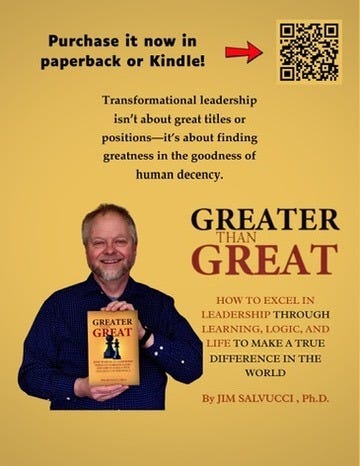The reviews of my new book, Greater than Great, are in!
“Greater than Great is not like all the rest! This is a quick but extraordinarily effective read providing the tools necessary to be successful in all types of leadership situations.”
“The very important insight that collaboration built on compromise is the most important goal of effective leadership is a real game-changer!”
“This book will provide you with the path to great leadership.”
“Overall, Greater than Great is a masterpiece and highly recommended reading for aspiring leaders, experienced managers, and anyone interested in cultivating a more thoughtful, effective leadership style.”
I swear I didn’t write any of these reviews!
Find Greater than Great on Amazon. Now available in Kindle, paperback, and hardback. It makes a great gift for that leader in your life . . . or for that boss you want to get out of your life!
People talking without speaking
People hearing without listening
People writing songs that voices never shared
And no one dared
Disturb the sound of silence
Paul Simon, “The Sound of Silence”
Have you ever been given the silent treatment? Have you ever been silenced?
Humans—being social creatures—rely on communication in all its forms to make connections. We need communication to thrive. In fact, communication is the second of the 4 Cs of effective leadership along with character, compromise, and collaboration. You simply can’t lead without being a good communicator.
But I want to talk about communication’s opposite: silence.
While there is a certain contemplative virtue in maintaining silence, that’s a choice and a rare one at that. And let’s face it; there’s also an alleged contemplative virtue to donning hair shirts and indulging in self-flagellation.
Silence—chosen or imposed—can be equally tortuous.
The Sound of Silence
If you’ve ever had to deal with someone giving you the silent treatment, you know what I mean. I’ve described before how when I was a young university dean, the president of our institution—the CEO and grand Poobah who held all of our fates in his sweaty palms—suddenly stopped talking to me. I never received a coherent explanation as to why, which is not surprising given that he refused to meet with me and wasn’t saying anything anyway.
Instead of telling you how profoundly unnerving this experience was, let me relate a particular incident to illustrate my mental state at the time. A few days after it all started, I was driving to work, contemplating or—more accurately—fretting over my precarious situation. How much trouble was I in? Was I getting fired?
I needed gas and stopped to make a left into a gas station. A kindly driver sitting at a light made a space in a line of traffic and waved me through to make the turn.
Under normal circumstances, I would have checked every angle before proceeding, but this time—distracted as I was—I just proceeded. That’s why the car that T-boned me was such a surprise.
Fortunately no one was hurt, and I don’t blame the university president for my misjudgment. Nonetheless, I can’t help but think that if my head were clearer, I wouldn’t have had that accident. Not even close.
Such is the corrosive power of silence.
If you are or aspire to be a leader, a lack of communication is virtually always the wrong move. I’m not saying you shouldn’t keep silent when appropriate or pick your battles. I mean that you must wield communication—both delivering and receiving messages—as your first and best tool to achieve just about anything as a leader.
Now, perhaps you might argue that the president’s silence itself communicated his displeasure with me. Well, sure, I guess in a general sense. But after two years of his pettiness and even to this day ten years on, I never learned precisely what displeased him. That meant I had no means to rectify it.
After a few months, in fact, I realized there was nothing I could do and just continued on in my normal way. Therefore, his silence, while cruel and torturous, changed nothing but my car insurance rates. Moreover, his behavior toward me made him look foolish to others.
Message delivered? Mission accomplished? I think not.
The upshot? His silence did motivate me to get the hell out of that stink hole and as far away from his carcass as possible, so my genuine gratitude to him for the push!
While that’s an extreme example, the whole range of the silent treatment—from unnecessarily withholding information to petulantly dummying up—can debilitate a team. An informed team is a trusting team, and a trusting team can build a healthy and effective culture. And that’s what we all want, right?
Right?
The Torture of Being Silenced
The flip side of the silent treatment is when someone silences another—takes away their voice. I challenge you to find any cruelty more dehumanizing.
Even physical and mental torture, while horrendous, most often accompanies forced silence. Aside from the thrilling screams of their victims, torturers aren’t typically big fans of freedom of expression. When this country was overrun with slavers, they kept enslaved individuals illiterate, thus eliminating a critical mode of learning and communication. And woe betide anyone who dared to speak out against their abusive overlords. Free speech and slavery don’t mix well.
In fact, can you imagine a scene where someone is being abused or persecuted and silence is not part of the mix? People will even commit murder primarily or solely to guarantee their victim’s silence.
Just as communication is the go-to tool for leaders, silence is the go-to tool for oppressors.
And silencing can take many forms—from out-and-out stealing someone’s voice to public shaming and aggressive shushing. No one likes to be shushed by the officious librarian for a reason. Enforced silence strips one of dignity. It can be humiliating.
Of course, there will be times when dissent should be quelled—such as after a decision has been made—but good leaders create a culture of trust where everyone has had their say and therefore knows when to be quiet and is.
Silencing can also be legally binding. In the modern workplace, lazy-minded employers overuse non-disclosure agreements or NDAs, which are among the worst types of institutional bullying. NDAs strip people of their dignity and allow abusers to scurry away scot-free—under force of law.
The Necessity of Communication
This is the part where I point out the glaringly obvious. Because they value truth, transparency, and human connection, great leaders loathe silence. Because they know the power as well as the limitations of communication, they maximize listening and messaging in order to understand, empathize, and convey. Communication is the life blood of good leadership, nourishing the relationships that are its beating heart.
Bosses, in contrast, see communication as a one-way convenience. For the worst, the more challenging the situation, the more likely they will talk down and to, never with. Leaders instead recognize communication not only as a tool but as an opportunity to create ties and build culture. It also offers a chance for the leader to grow and improve through feedback and learning.
Bosses miss that grand opportunity. In fact, missing opportunities is one of the defining qualities of bosses—in sharp contrast with leaders.
To be clear, communication constitutes only one aspect of leadership, but a vital one. Leaders can accomplish nothing without it. Communication works in both directions, the leader delivering messages to the team and vice versa. Without both forms, relationships rapidly deteriorate and dysfunction sets in. Therefore, the more effective the communication—giving and receiving—the more effective the leadership and the stronger the organizational culture.
Silence, being the very antithesis, is generally a poor choice—the go-to of mere bosses. Whether it’s withholding information and limiting communication or suppressing the power of expression, unnecessary silence stifles relationships and crushes culture.
Bosses who regularly employ silence—keeping silent or enforcing it—have no interest in such things, which is why their efforts always fall short. Their very silence speaks to their ineptitude.
Great leaders know to maximize communication. They habitually practice openness and even radical transparency. They understand that humans crave, even need social connection, which only exists through communication. Depriving team members of communication—limiting information or suppressing their voice—denies them a vital part of their very humanity.
Teams, institutions, and businesses are inherently human endeavors. As such they are built on relationships and culture. True leaders embrace that humanity. They nurture and grow it. They know that the human skills, the so-called soft skills, are the hardest yet most rewarding of all. Bosses eschew those skills, preferring command and control approaches and opting to shriek with silence.
Other species communicate in limited ways, but the robustness of our communication defines our humanity. We are, at our core, communicators. That’s why true leaders find the sound of silence deafening.
Have you ever been silenced or received the silent treatment? Have you ever done so to others?
Great leaders learn to maximize communication, and I can help.
Unlock the Great Leader Within! Download my free resource, the Transform To GREATness Toolkit, now!
I look forward to hearing from you.
Intro and outro podcast theme music by LiteSaturation from Pixabay.
Like the sound of my podcast?
I use Descript to record and edit, and if you record sound and video, so should you. Descript’s AI assistance has transformed my process and improved my recordings. Now editing is a breeze!
Interested? Use my affiliate link to try Descript for free: https://get.descript.com/t8zotbxmi6ds.
Try it and let me know what you think.
Need an experienced speaker or a podcast guest? Invite me!
If you want a TEDx speaker for your event or corporate training, click on my Speaker’s Page.
Looking for an articulate, dynamic, and insightful podcast guest? Check out my Podcast Guest Page.
About Dr. Sal
I founded Guidance for Greatness to mentor rising professionals after serving 30 years in higher education as an English professor, dean, and VP.
In my speaking, writing, and coaching, I blend academic credentials (Ph.D. from Toronto, certificates from Harvard and ACE) with practical coaching certifications (Tiny Habits, Thrive Global) to offer something different: leadership development built upon human decency.
My mission? To guide today’s managers to become the next generation of great leaders.
I offer practical, values-driven strategies so that managers can lead authentically.
Why? Because great leaders aren't just effective managers—they're teachers whose example makes a true difference in the world.
It’s here!
Discover the practical strategies that transform good managers into exceptional leaders. Look for my new book, Greater than Great: How to Excel in Leadership through Learning, Logic, and Life to Make a True Difference in the World, out now!
Grab a copy for yourself and for that special leader in your life (or your lousy boss)!




















Share this post